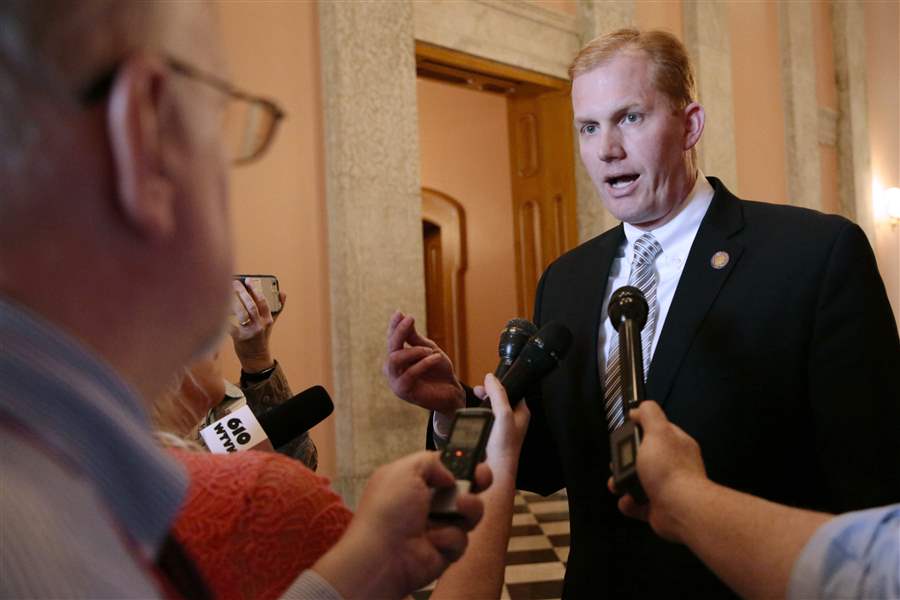
Lawmakers push back against Kasich order on Lake Erie
7/18/2018
Ohio House Speaker Ryan Smith
ASSOCIATED PRESS
Republican legislative leaders and farmers alike on Wednesday urged Gov. John Kasich to rescind last week’s executive order allowing the state to get tougher on the nutrient pollution that fuels Lake Erie’s toxic algal growth.
Rep. Brian Hill (R., Zanesville), chairman of the House Agriculture and Rural Affairs Committee, said the order will last forever with no end in sight. He appeared with House Speaker Ryan Smith (R., Gallipolis) in criticizing the governor’s move.
“We’re calling on the Ohio Conservation Commission to consider the lack of transparency and lack of input from the agriculture community,” Mr. Hill said. “It’s critical that more time be allowed for discussion and that we don’t unintentionally hurt 7,000 farmers by these fast-moving rules.”
The Ohio Soil and Water Conservation Committee will meet Thursday to consider the administration’s request to designate eight watersheds and partial watersheds within the Maumee River Basin as distressed.
That would trigger a months-long process of writing rules that farmers would have to follow within those watersheds to reduce the amount of nutrients running off their properties into waters that ultimately make it to Lake Erie and feed harmful algal growth.
The rules are expected to be in place in time to affect the 2020 crop season, affecting an estimated 7,000 farms and 2 million acres of farmland.
Distressed designation will be sought for the Platter Creek, Little Flat Rock Creek, Little Auglaize River, Eagle Creek, Auglaize River, Blanchard River, St. Mary’s River, and Ottawa River watersheds.
Such a designation would not be lifted until the Department of Agriculture confirms sustained recovery and improvement.
“Farmers are committed to working with all parties to find the correct science to solve this problem,” said Sen Bob Hackett (R., London), chairman of the Senate Agricultural Committee.
The Kasich administration has argued that current voluntary efforts on the part of farmers in the western basin of Lake Erie have not moved the needle enough in helping the state meet its commitment with Michigan and Ontario to reduce phosphorous loading into the lake by 40 percent by 2025.
It could not find a GOP lawmaker willing to introduce legislation that would lead to the greater powers of the Department of Agriculture to enforce tougher restrictions with penalties for non-compliance on top of the voluntary efforts by farmers elsewhere.
“This is going to take an overwhelming amount of manpower” to implement the executive order, said Duane Stateler, McComb hog farmer and grain producer. “I was disappointed that people who are making these decisions have not visited our farm to see the extensive work we’ve been doing for the past two years.”
Mark Drewes, a Custar grain producer, insisted farmers have made progress.
“The lake did not become this way overnight,” he said. “I look back at my youth and how we did things. It took generations for things to get to the way it is, and it will take generations to repair it...
“I know my neighbors,” he said. “I know my peers. We are all striving for the same goal. We all want to do the right thing.”
Jon Keeling, Mr. Kasich’s press secretary, said: “The General Assembly wisely created a system in which an independent commission makes decisions to protect sensitive watersheds so that politics and special interest pressure doesn’t get in the way. We’re seeing the value of that system right now. In the absence of the General Assembly acting earlier this year to protect watersheds, existing measures the General Assembly created, utilizing indisputable science, are rightly being put to work.”
Mr. Kasich last week also signed into law the General Assembly’s latest effort, setting aside $36 million to put more money behind efforts to address the problem, including providing assistance to farmers for equipment and technology to implement better fertilizer application on farmland.
Peter Bucher, water resources director at the Ohio Environmental Council, said he hopes any discussions at the Statehouse lead to progress.
“Time is of the essence,” he said. “Each year we wait to fix Lake Erie, the problem gets more expensive and more time-intensive to fight. Let’s all sit down together and get the job done.”
Contact Liz Skalka at lskalka@theblade.com, 419-724-6199, or on Twitter @lizskalka.